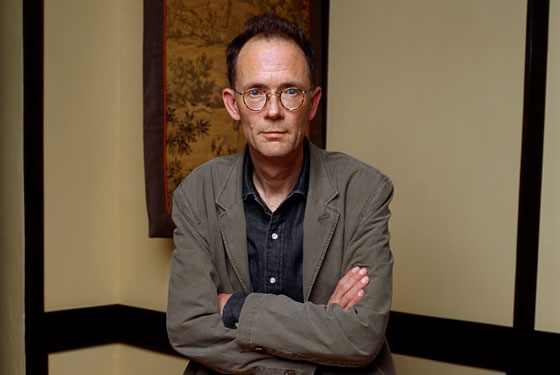
William Gibson may not have invented the Internet, but he did coin the word cyberspace, and his 1984 novel Neuromancer has inspired everything from Wired magazine to The Matrix. Reality has since caught up with his imagination, where military-industrial conspiracies, surveillance, and near-invisible marketing are everywhere. His new Spook Country takes place amid the orange alerts of 2006, during the hunt for a missing and highly valued shipping container. Gibson spoke to New York.
One of your publishers posted the pitch letter for Spook Country online, and it doesn’t sound much like the book I read.
The miracle is that any of that material survived. When I started, I thought that the “locative art” stuff would work the way immersion technology did in my earlier fiction. Then I started liking that it wasn’t going to do that.
Why?
Well, one character says that cyberspace is inverting, turning inside out. I have a feeling that being aware of being connected will be an anachronism, because we’ll be connected all the time. I have this inkling that the whole idea of cyberspace is going to seem fabulously quaint in 20 or 30 years.
Yes—there’s that scene in which a character puts on goggles and says, “Ooh, you mean virtual reality, isn’t that what we’re supposed to be doing now?”
Yeah, that’s true—you’re the first to have noticed. I laughed more in the course of writing this novel than in previous ones.
And you play with “locative art”—installation art that people find using GPS. Is this real?
Well, if you Google locative art, you’ve got your afternoon cut out for you. But the people doing it are academic artists, art-school people. I was imagining more lowbrow street art. The thing I’ve come to see underlying all of my writing is that most societal change is technologically driven, and that it’s almost never legislated. Telephony or antibiotics, all these things that have tremendous effects—people just invent them! And we can’t ever know what the street will do with them.
The market and marketing have been huge in your last two novels.
Well, it’s what we do now. When I was a child the United States made its own wristwatches and cars. As we’ve quit manufacturing stuff, we’ve begun trafficking in branding, which would’ve been incomprehensible in 1910—not the thing you made but what you call it. And as each generation of consumers has become more aware of marketing, so marketing has had to become quite byzantine.
And secretive. Science-fiction authors seem obsessed with conspiracies and surveillance.
Yes. The tool kit they issued me is perhaps the best one for addressing the fuck-the-system present moment—for material which otherwise would be too hot or too unpleasant or too tedious to handle. It’s like science fiction gave me the super-duper oven mitts that I need.
Did you see the stories about the surveillance cameras headed for New York, based on London’s security ring?
No, but I’m not surprised. They built that in London during a really long and heavy-duty terrorist operation, and then they found that it had other uses. Hence the popularity of hoodies, which are really just about avoiding cameras.
You love small details like that, don’t you?
Part of it comes from having moved to another country when I was young. It made me appreciate all these small cultural differences that are only there to communicate some sense of self. But it’s different now, when I’m not making all of the symbol systems up.
Like picking Union Square for an action scene?
Yes. If this was one of my early novels, they’d be running into the Dystopian embassy, and I’d make it all up out of high-grade parts of the real world with their serial numbers filed off. I wouldn’t pick a real place and worry about lines of sight—when I went to Union Square a couple of months ago, I saw that I hadn’t understood the levels. I don’t think anybody will ever notice. Still, it’s not right.